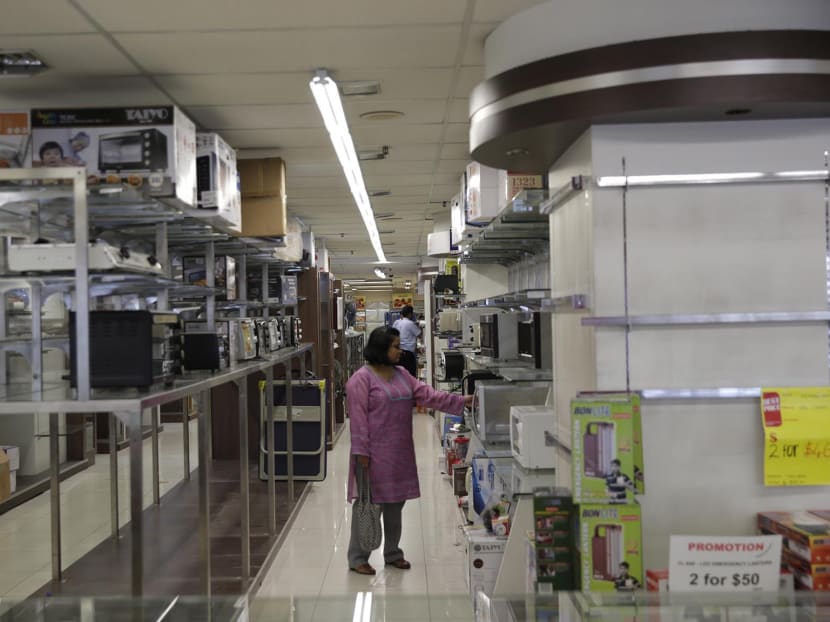Mustafa cuts retail space, closing its Serangoon Plaza store after 30 years
SINGAPORE — By next month, Singapore’s biggest 24-hour mall, Mustafa, will shut its 65,000sqf Serangoon Plaza store, reducing its total retail space by a quarter, due to redevelopment work on the site.

By Feb 2017, Singapore’s biggest 24-hour mall Mustafa will be shutting its 65,000 sq ft Serangoon Plaza store, reducing its total retail space by a quarter. Photo: Wee Teck Hian/TODAY
SINGAPORE — By next month, Singapore’s biggest 24-hour mall, Mustafa, will shut its 65,000sqf Serangoon Plaza store, reducing its total retail space by a quarter, due to redevelopment work on the site.
For the past three decades, retailer Mohamed Mustafa & Samsuddin (MMS) has been leasing space at the plaza in addition to the adjacent Mustafa Centre — which the company owns — on Syed Alwi Road.
Sold in an en bloc deal in November 2013, Serangoon Plaza is slated for demolition next month, before the site is redeveloped into the 19-storey Centrium Square, a mixed-use complex consisting of offices, medical suites and retail stores.
Occupying three floors and about 70 per cent of the total retail space, Mustafa is the largest tenant at the plaza.
The rest of the building is taken up by offices. None of the existing tenants will be retained, said a spokesperson for building owner Feature Development, which is an associate firm of Tong Eng Group.
She said that Serangoon Plaza will be demolished immediately after it is vacated by all tenants early next month. Construction for the new complex will then begin, and it is slated for completion in 2019. Centrium Square’s retail space will be fully taken up by Canali Logistics, the spokesperson added.
Mustafa has been a tenant at Serangoon Plaza since the mid-1980s, gradually expanding its retail space in the building to offer money exchange services, as well as sections selling gold and jewellery, clothes, cosmetics and shoes, among other goods.
The plaza was fully bought by Feature Development — which had owned about 90 per cent of the building previously — about three years ago in a S$400 million en bloc deal.
But the fate of the Mustafa store had been unclear until recently.
When TODAY visited the plaza on Monday and Tuesday, the floors occupied by Mustafa were being cleared out, with employees packing and moving the goods.
There was a notice at the entrance informing customers that the store will be closed on Feb 1 and all the merchandise was being moved to Mustafa Centre, which has a total retail space of more than 200,000 sqf.
When contacted, MMS managing director Mustaq Ahmad said: “We will be closing our retail space at Serangoon Plaza entirely by early February. It will be consolidated with the main store ... The staff will also be re-deployed there. Our retail space, as a result, will be down by about 25 per cent.”
About 180 employees — or more than 10 per cent of Mustafa’s total staff strength of 1,650 — are currently working at the Serangoon Plaza store.
Despite the general retail slump, Mr Ahmad said his business is “doing well with the steady flow of tourists”. Nevertheless, the retailer froze hiring for the past months in view of the downsizing of its retail space, he added.
Property analysts felt that the move was an opportunity for Mustafa to consolidate its operations amid the weak economic outlook.
Ms Christine Li, director of research at Cushman & Wakefield in Singapore, added: “If Mustafa has been doing well even at a time like this when other retailers are bleeding, this enforced space (reduction) will mean a loss of revenue due to reduced retail space.
However, given the retail sector slump, it could trigger cost-cutting initiatives by the retailer.”
Mr Desmond Sim, head of CBRE Research in Singapore and South-east Asia, noted that Mustafa could make use of the chance to improve business efficiency in the current climate. Customers may also benefit from a greater concentration of the goods, he said.
Still, regular shoppers at Mustafa are concerned that the move could mean bigger crowds — especially during weekends — and more clutter at the remaining premises.
Homemaker Archana Pani, 32, said: “Mustafa getting smaller means the store getting more crowded. It is already packed with so much stuff.”
Ms Vidhi Joshi, 31, who works in a shipping company, added: “I can’t imagine Mustafa getting smaller. If it gets more packed and crowded, I may have to look at picking up the essential stuff from there during the weekdays (instead).”








